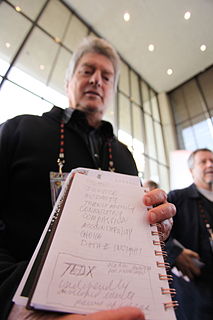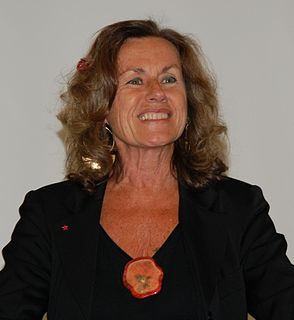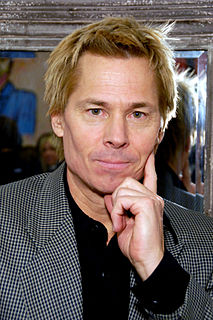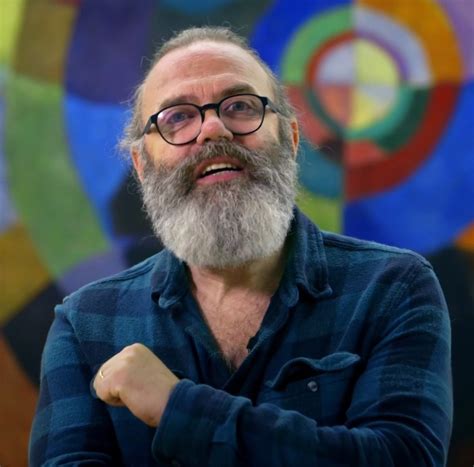Ein Zitat von Siri Hustvedt
Die amerikanische Massenmedienkultur mit ihren Berühmtheiten, ihrer Einkaufshysterie, ihren O-Tönen, formelhaften Handlungssträngen, übernommenen Ideen und widerlichen Wiederholungen deprimiert mich.
Verwandte Zitate
Das Tolle an sozialen Medien ist, dass Sie Ihre eigenen Erfahrungen kuratieren. Das führt zum Aufstieg von Nischen-Prominenten, die eigentlich genauso beliebt sind wie Massen-Prominente, aber weil es für traditionelle Medien keinen Anreiz gibt, in sie als Prominente zu investieren, finden sie ein Zuhause, wo Menschen ihnen auf Instagram folgen können.
Zu viele Politiker verlagern die kritischen Themen unserer nationalen Gespräche von einer amerikanischen Markenplattform mit „großen Ideen“ hin zu eng fokussierten, polarisierenden Phrasen, die die Parteiphilosophie über das stellen, was früher als Gemeinwohl verkündet wurde. Diese Vorstellungen spalten uns in den meisten Fällen eher, als dass sie uns binden.
Heutzutage werden enorme Anstrengungen unternommen, um die amerikanische Öffentlichkeit davon zu überzeugen, dass wir nur Konsumenten von Medienmanipulationen, Sprüchen und Spindoktoren sind. Dass wir uns nur um uns selbst, Geld und so weiter kümmern. Dass aus Leidenschaft und Überzeugung gehandelt wird, macht keinen Unterschied. Aber die ganze Geschichte zeigt, dass es so ist.
Die Second Wave Society ist industriell und basiert auf Massenproduktion, Massenverteilung, Massenkonsum, Massenbildung, Massenmedien, Massenerholung, Massenunterhaltung und Massenvernichtungswaffen. Wenn Sie diese Dinge mit Standardisierung, Zentralisierung, Konzentration und Synchronisierung kombinieren, entsteht ein Organisationsstil, den wir Bürokratie nennen.
Die Verdummung der amerikanischen Sprache zeigt sich am deutlichsten im langsamen Verfall inhaltlicher Inhalte in den enorm einflussreichen Medien, in den 30-Sekunden-Opern (jetzt nur noch 10 Sekunden oder weniger), in der Programmierung auf dem kleinsten gemeinsamen Nenner, in leichtgläubigen Präsentationen über Pseudowissenschaft und Aberglauben, vor allem aber eine Art Feier der Unwissenheit.
Die Popkultur ist in eine nostalgische Malaise geraten. Die Online-Kultur wird von trivialen Mashups der Kultur dominiert, die vor dem Aufkommen von Mashups existierte, und von Fangemeinden, die auf die schwindenden Außenposten zentralisierter Massenmedien reagieren. Es ist eine Kultur der Reaktion ohne Handeln.
Ein ernstes Problem in Amerika ist die Kluft zwischen der akademischen Welt und den Massenmedien, die unsere Kultur ausmachen. Professoren der Geisteswissenschaften haben trotz all ihrer linken Fantasien kaum direkte Kenntnisse über das amerikanische Leben und keinerlei Einfluss auf die öffentliche Ordnung.
Ich war vor ein paar Jahren im Fernsehen und der Reporter fragte mich: „Wie fühlt es sich an, in den Mainstream-Medien zu sein? Es kommt nicht oft vor, dass Dichter in den Mainstream-Medien auftauchen.“ Ich sagte: „Nun, ich denke, Sie sind die dominierenden Medien, die dominierende Kultur, aber Sie sind nicht die Mainstream-Medien. Die Mainstream-Medien sind immer noch die Hochkultur der Intellektuellen: Schriftsteller, Leser, Redakteure, Bibliothekare, Professoren, Künstler, Kunstkritiker, Dichter, Romanautoren und Leute, die denken. Sie sind die Mainstream-Kultur, auch wenn Sie vielleicht die dominierende Kultur sind.“







































